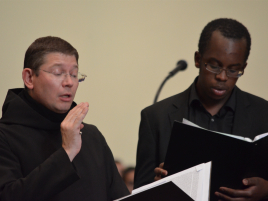Bhaktivedanta College Students Represent ISKCON at Assisi Interfaith Events
By Kumari Kunti Sherreitt | Nov 19, 2011

Saint Francis of Assisi, a spiritual leader renowned for centuries, established the Franciscan order in the Catholic tradition. He is not so well known for creating the first interfaith event of the Catholic Church. In memory of his worthy efforts, various Catholic institutions commemorate his initiatives at interreligious dialogue with a grand interfaith event. Recently, Bhaktivedanta College students were invited, through the Radhadesh communications department, to represent ISKCON at two Assisi memorial interfaith events in Belgium.
The first took place at the former monastery (now a famous brewery) in Maredsous, and the other at a nuns’ abbey tucked away in the city center of Liege. All the major religions in Belgium were represented, and ISKCON represented Hinduism.
The assignment was for the tradition to create an experience of peace. We students used Srila Prabhupada’s peace formula. The Sri Isopanisad principle that everything belongs to the Lord and therefore we should take only that which is allotted to us was the foundation of our ten-minute presentation. Two students recited this verse after reciting an invocation, and then we beautifully sang some Brahma Samhita verses accompanied by a guitar. We ended the meditation on peace by chanting Hare Krishna, the maha-mantra.

Many of the presentations were musical, while some were simply readings of sacred texts. Distinctions between the faith groups were very clear externally: dress, mannerisms and so on. However, some slight introspection found an internal unity in most faiths’ goals.
The abbeys where the events took place are similar to the ashram of the Vaishnava tradition. Members live in a communal environment, studying, praying, worshiping, and eating together.
The beautiful similarities found in various traditions were expressed not only in some similarities of lifestyle but also in the expressions of faith, despite the divides of both the French culture and language of all the other participants.

While ISKCON sang or recited mantras, the Sikhs read enchanting poems by Rumi, accompanied by a traditional harp. Buddhists led a practical exploration into meditative peace, and the Catholic hosts sponsored an a capella, or all-vocal, choir.
The Bhaktivedanta College presentation aroused deep appreciation in the audience, though the organizers had asked that the audience not applaud for any of the presentations. Why? The students’ presentation was deep and out of the ordinary, and our group, despite its youthfulness, had made a commitment and an effort to participate in the events.















